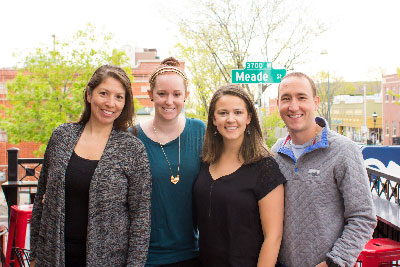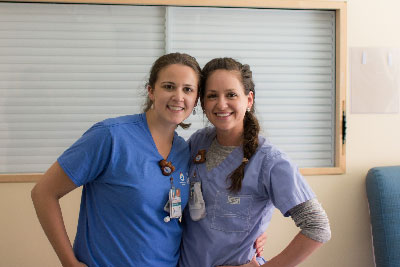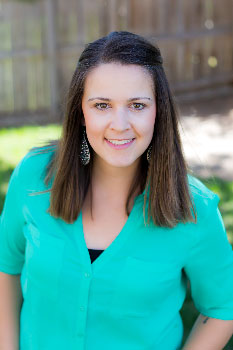There may have been a time when the mere mention of "ethics" would send most nurses, including Stephanie Trowbridge, scurrying away. But she is now a champion ethics advocate, leading a five-member team of nurse ethics liaisons in the PICU department in which she works at Children's Hospital Colorado.
 But the married mother of two also has her own photography business and — as if to mock the notion that 24 are too few hours in a day — she is an avid runner, having completed a marathon and several half-marathons because, of course she has.
But the married mother of two also has her own photography business and — as if to mock the notion that 24 are too few hours in a day — she is an avid runner, having completed a marathon and several half-marathons because, of course she has.
Getting Started
"My aunt was a nurse," Trowbridge explained, "and when I was little I wanted to be just like her. I did not study science until college so until a nursing professor challenged me to apply for nursing school I believed that a major in P.E. was the only option for me. My first day in nursing school, I cried; I realized I had arrived at my calling."
"I first worked at a small regional center that had a 12-bed pediatric unit. We, the pediatric nurses, would respond to any pediatric traumas in the Emergency Department. After my first two traumas, a NAT and a diaphragmatic hernia unknown at birth and sent home, where I was the "expert RN," I couldn't shake two things: First, I loved it. Second, I wanted to know more. I began working my way to an amazing Pediatric Intensive Care Unit at Children's Hospital Colorado, where I am today - because, I was always going to work in Pediatrics.
"I was chronically ill as a child and into my adulthood. There were not many answers for me based on many factors, but being a child with chronic pain lead me to specifically working with children even prior to nursing. I told my nursing mentor I would only be a nurse for children. If I have the opportunity to relieve even a small amount of suffering for a child it means the world to me."
Becoming an Ethics Liaison
Seven years ago, Trowbridge was presented with a unique opportunity — but she couldn't possibly guess it at the time.
"When I first became one of two Ethics Nurse Liaisons my heart rate would increase, my palms became clammy and my tongue would refuse to work whenever I would bring up my role to a peer or a provider. The word 'ethics' alone would seem to create a visceral reaction, whether it was from fear, bad memories or anxiety, I would want to hide and even pretend to take back the words.
"'I tried that once and I will never do it again,' was the most common response I would get when referring to an ethics consult. I think at the point of the request to join the committee warm bodies to fill the hopes and dreams of the initial idea were welcome."
The Initial Idea
"We have a unique team within Children's Hospital Colorado that started a year or two before I joined," she said. "We have a traditional ethics team that consults and is made up of various providers and nurses within the institution. To assist ethics education and staff support surrounding ethics, a Nurse Ethics Liaison team was formed. My team represents the PICU.

We are not part of the ethics consult team. In the PICU, our team supports our unit during and after ethical challenges. We have learned that this is most effective by mentoring and supporting our peers in moral truth. We are in the trenches together. We all face moral distress and ethical dilemmas. We listen and are objective because we are courageously encouraging these conversations to happen. We desire to help during these difficult situations when they occur, not if they will occur. Because of this understanding, we are ready at all times to listen to, mentor through and advocate for the concerns of our peers. And once a setting hesitant to ethical consultation, now the PICU averages eight ethics consults each year."
How Does it Work?
The function of the program is simple.
"Currently, I lead the team/committee of PICU Nurse Ethics Liaisons," Trowbridge said. "During our monthly meetings we support our team members first, encouraging self-care and community. We discuss any ethics challenges that might have arisen in the previous weeks and if we need to review any components of the challenges. We all have individual projects although we all work together to collaborate and promote each project.
"Projects can include self-care sessions, rounding at the bedside and educational newsletters about ethics consults. These projects are incorporated into our clinical ladder requirements and allow for greater exposure to the particular needs occurring on the unit. We share the responsibility of being 'on-call' for our peers if any challenges arise. We attend a monthly house-wide ethics liaison committee meeting that incorporates ethics education, case studies and strategies for enhancing the ethics climate within the institution."
A Matter of Trust
For any program to work, though — no matter how well-meaning or noble the intention — there must be one element that Trowbridge knew neither she nor her team could supply. Trust.
"That was the most important thing," she said. "But change doesn't happen overnight, and we can't just think something's a good idea. We have to go with the culture. So the education and things -- that works for other units, but it doesn't work for our unit.

So when I came on, I had no idea what I'd gotten myself into, and I went and rounded with some of the nurses and I was like, 'Tell me about your experience with ethics,' because I was trying to figure it out, and they said, 'Been there, done that, never doing it again.' And I said, 'Well, why?' And they're like, 'We don't want to be thrown under the bus.' So really being able to help everyone understand that we're a team here and how can we work as a team to then, when we need to, get ethics involved.
So, it's going slow, but it's going in the right direction -- and some of them are saying that the nursing staff, they're not so critical of the providers; they're ready to work more as a team. And I think it's a whole cultural aspect. It's not just us that's doing this, but it's really fun to be a part of."
A Perfect Example
As if to underscore the progress of this really pioneering program, Trowbridge shared an example.
"I was the primary nurse ethics liaison for one of the most ethically challenging situations I have ever experienced. For two-plus weeks, twice a day, I checked in on the bedside nurse via a phone call, a note left at the cubby, a text message or an in-person conversation. My phone number was in the nurses' cubby for any time of the shift that I could offer support. One of the primary nurses had been hesitant to participate in discussions related to ethical challenges in the past. Through the experience I gained a friend. I was there when she needed someone the most. We still talk about that patient. We respect each other and she knows I will be there again.
"That experience taught me that even the most difficult of situations can promote change and resilience."
Work/Life Balance
Everyone knows that maintaining — or at least trying to — a healthy life away from work is vital. This is something that program espouses as well.
Part of our current efforts," Trowbridge said. "Are to encourage the ethics of self-care. If we encourage our peers to have good mental, emotional wellbeing we believe that excellent care continues to the bedside."
She knows this all too well.
"After my first trauma, a three-year-old found down after being abused several days before, I had PTSD. I started looking for bruises on any child I saw. I could not sleep. I did not want to go to work. I quickly realized it and started developing healthy habits to help me when I encountered difficult situations.
"Photography had always been my other love since middle school, and when I started in the intensive care unit I especially needed something extra to help me deal with the pressures and memories. And I needed a creative outlet. So I told my husband, 'I need my camera back in my hands,' and invested in that, and within a year started a business. When you work with a hundred women, if one woman has something and she tells someone about it, then everybody starts finding out about it. I had to start a business so that I could manage all these requests for photography, and then not only did I love it, but it was a great outlet. Then it enabled me to have a great balance. Taking pictures of happy, healthy children and families gives balance to the intensity of my nursing profession. My hobby grew into a business and now I balance both loves along with being a wife and mother."
I meet with a counselor monthly. I also volunteer at a teen mom's organization where I photograph, network and mentor. I give back to my church community and lead other nurses in a Bible study. Life is full and work is hard but I wouldn't have it any other way. I do whatever I can to show up and to make a difference.
And Marathons?
But wait, there's more.
Trowbridge — with all the free time she doesn't have — took up running a few years ago and has traversed the 26.2 miles that encompass a marathon.
"I know. It's that stinking 0.2 miles, man, just kills you every time. I had to move out of Oregon, and I started running when I moved to Colorado, and it was slow-- I'm still slow-- but I have run one marathon and I think 10 half-marathons. Right now, because of two girls and how busy work is and all that, I'm just doing 5Ks and 10Ks."
In fact, she sees a similarity between running and her ethics work.
"I'm learning a lot about change. Change has to happen because it is desired, not forced. I have been a part of another huge project with ambitions of a culture change. The timing was off and the change wasn't desired. We tried to force it and it failed. That's when I dove into ethics. I have learned that cultivating a robust ethics climate is like a marathon. We do not go out one day and decide we are going to run 26.2 miles. We plan. We train. We have good and bad training runs. But, we keep running.
"Our nurse ethics liaison team is like that. We have good strides of growth and we have setbacks, but we keep running. I'm really proud to be in this for the long haul."
Finally, Trowbridge has some words for nurses everywhere.
 "Nursing is precious. It's the heartbeat of healthcare, I believe. It's the first impression of a whole experience. A nurse is the first and the last person you see when you wake-up and fall asleep in a hospital bed. They are the person you call when you need something. A nurse learns to be intuitive and uses it for the good of the patient. If I can be just a small part of this influence I'm all in."
"Nursing is precious. It's the heartbeat of healthcare, I believe. It's the first impression of a whole experience. A nurse is the first and the last person you see when you wake-up and fall asleep in a hospital bed. They are the person you call when you need something. A nurse learns to be intuitive and uses it for the good of the patient. If I can be just a small part of this influence I'm all in."